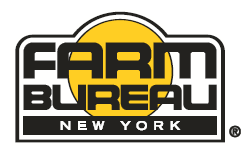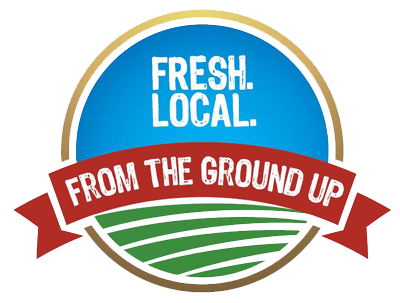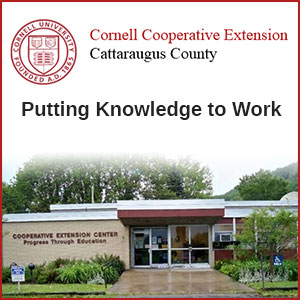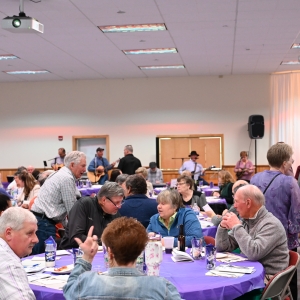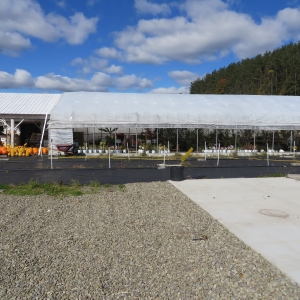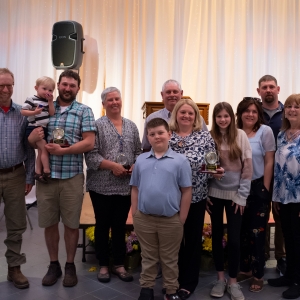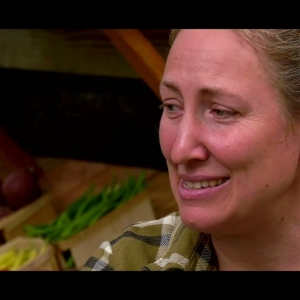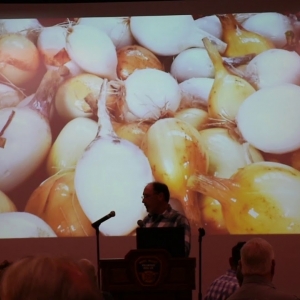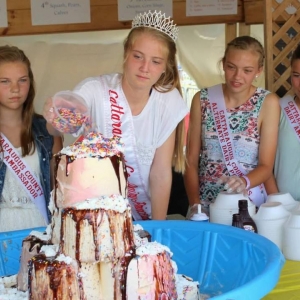Other Ag News:
(Washington, D.C., May 11, 2025) – U.S. Secretary of Agriculture Brooke L. Rollins today announced the suspension of live cattle, horse, and bison imports through U.S. ports of entry along the southern border due to the continued and rapid northward spread of New World Screwworm (NWS) in Mexico, effective immediately. NWS has been recently detected in remote farms with minimal cattle movement as far north as Oaxaca and Veracruz, about 700 miles away from the U.S. border.
Since its establishment in the 2008 Farm Bill, the National Institute of Food and Agriculture (NIFA) has advanced research that helps American farmers and ranchers stay at the cutting edge of innovation and adapt to challenges such as natural disasters. Farmers and ranchers depend upon NIFA-supported research that invests in developing resilient crops, innovative soil practices, and other science that serves producers at all scales. But this critical work is now under threat.
A series of recent Executive Orders has placed NIFA’s research portfolio, particularly research related to agricultural climate resilience and adaptation, at risk. American farmers and ranchers are already on the front lines of the climate crisis, facing increasingly extreme droughts and floods. Terminating NIFA’s climate research would undermine its future resilience. In addition, the recently released FY26 Presidential Budget Report suggests reducing NIFA’s budget by over $600 million. It specifically calls to eliminate what the President’s office says is wasteful programming in NIFA, such as activities related to climate change, renewable energy, and more.
Research underpins every aspect of successful and viable farming, whether it’s a fifth-generation commodity producer looking to diversify their crop rotation, or a beginning farmer interested in tapping into the huge unmet demand for grass fed beef. NIFA programs, like Agriculture and Food Research Initiative (AFRI) and Sustainable Agriculture Research and Education (SARE), remain widely popular with farmers, farmer-serving organizations, and research institutions alike. The targeting of “climate related” research, as well as the continued attempts to cut public funding that supports agricultural research at the US Department of Agriculture (USDA), puts American farmers at a disadvantage as agricultural research tries to keep pace with the growing challenges related to the state of the rural economy, soil health, and competitiveness of producers.
This blog post examines the scope of climate change research at NIFA, and the potential loss posed by deprioritizing climate change research.
Driving Climate Resilience in Agriculture: Insights from NIFA’s Climate Action Agenda
NIFA is the primary extramural science funding agency of USDA and plays a vital role in advancing agricultural research, education, and outreach to address pressing societal challenges. In May 2022, NIFA published its Climate Adaptation and Resilience Plan, outlining an ambitious set of goals for NIFA to advance science and technology to tackle the climate crisis and its impact on the nation’s farming, ranching, forestry, fishery, and rural communities.
Then, in November 2024, NIFA released the NIFA Climate Change Priority Team: Accomplishments and Action Agenda Report, highlighting their ongoing efforts to invest in research that tackles the impacts of climate change on agriculture and food systems. This recent report outlines major accomplishments in achieving those goals, such as integrating climate change into competitive funding opportunities and fostering innovation in climate-smart practices.
Broadening the Scope of Climate-Focused InvestmentsOne of NIFA’s most significant achievements is incorporating climate change into its major funding opportunities, such as those within the Agriculture and Food Research Initiative (AFRI). These investments span research, education, and extension activities and support groundbreaking solutions like climate-smart perennial crops and methane-reducing feed additives for livestock.
Several key programs, such as the Foundational and Applied Sciences (FAS) and Sustainable Agricultural Systems (SAS) initiatives, have become hubs for multidisciplinary efforts, funding projects that integrate cutting-edge technology with practical farming applications. For instance, the FAS program Rapid Response to Extreme Weather Events Across Food and Agricultural Systems supports “critical and urgent solutions in rapid response to extreme weather and disaster impacts on the nation’s food and agricultural systems.”
The SAS initiative supports transdisciplinary projects that focus on “mitigating, adapting, and increasing the resilience of agricultural and forestry production systems to climate change.” For example, the University of Minnesota’s Kernza® initiative is revolutionizing sustainable grain production by developing perennial crop systems that enhance soil and water health while supporting rural economies. NIFA has awarded approximately $36.5 million in awards through FAS and $525 million through SAS.
Unfortunately, the SAS Request for Applications (RFA) is currently not posted and listed as “under review.” The termination or major transformation of this initiative would be a serious loss to developing a resilient agricultural and food system that serves American farmers and ranchers.
Figure 1: SAS Funding Awarded
Integrating Climate into Long-standing ProgramsIn addition to new initiatives such as FAS and SAS, NIFA has invested in climate change science through established programs. In 2022, approximately 15% of NIFA’s total competitive funding supported research, education, and extension related to climate change. Climate research continues to play an important role in established programs such as the Organic Agriculture Research and Extension Initiative (OREI), Organic Transitions Program (ORG), and Sustainable Agriculture Research and Education (SARE). Unfortunately, OREI and ORG also do not have a current Request for Applications (RFA) and are currently “under review.”
SARE has awarded approximately $176 million in funding since 2019. While SARE is not solely focused on climate related research, education, and extension, it has a systemic focus on resilience and sustainability.
Figure 2: SARE Funding Awarded
Established in 1988, SARE is unique in its emphasis on farmer-driven research and its regional approach to addressing agricultural challenges. For example, The Hawaii Good Food Alliance and partners are driving a project to address regional challenges like geographic isolation, climate change, and limited infrastructure in Hawaii, Alaska, Guam, American Samoa, and CNMI. They are doing this by delivering tailored workshops, training, and technical assistance focused on sustainable practices, such as soil health, agroforestry, and ecological farming, empowering communities to build resilient and self-reliant food systems.
Collaborating with Other Agencies for ClimateNIFA has actively collaborated with other federal agencies to advance climate change science and solutions, leveraging partnerships to maximize impact. For instance, NIFA worked with the National Science Foundation (NSF) to develop programs like “Signals in the Soil,” which focuses on innovative sensors and soil-ecosystem modeling, and Future-Proofing Plants to a Changing Climate, which supports multidisciplinary research to connect plant sciences with field performance. Additionally, NIFA has partnered with the US Department of Energy (DOE) and DOE Regional Resource Hubs to support the development of low-carbon bioenergy and biobased products, aligning agricultural innovations with energy sustainability. These interagency efforts demonstrate NIFA’s commitment to integrating resources and expertise to tackle climate challenges comprehensively. The recent Executive Orders place not just NIFA-funded RFAs at risk but also these innovative inter-agency collaborations.
Looking Ahead: Continue to Invest in NIFA Climate Research
The 2024 NIFA Climate Change Priority Team Report is a testament to how NIFA has invested in innovation, empowering vulnerable communities, and fostering cross-sector collaboration to lay the groundwork for a sustainable agricultural future. The research supported by NIFA helps producers adapt and innovate in the face of increasing natural disasters. Gutting this research would undermine decades of scientific innovation and threaten the future of American agriculture.
The post Farmers Need Climate Research to Thrive appeared first on National Sustainable Agriculture Coalition.
(Washington, D.C., May 8, 2025) – U.S. Secretary of Agriculture Brooke Rollins will visit the United Kingdom May 12-14. This comes after President Donald J. Trump announced today, on the 80th anniversary of Victory in Europe, a new trade agreement in principle that will lower tariffs, remove trade barriers, increase market access, and strengthen cooperation on economic security. The President secured major wins for American agriculture. This deal provides significant expansion in U.S.
FOR IMMEDIATE RELEASE
Contact: Laura Zaks
National Sustainable Agriculture Coalition
press@sustainableagriculture.net
Tel. 347.563.6408
Release: On the Eve of House Agriculture Committee Markup, Farmer-Serving Organizations Urge Congress to Stand for a New, Full Farm Bill over Budget ReconciliationWashington, DC, May 8, 2025 – Today, the National Sustainable Agriculture Coalition (NSAC) joined 160 farmer-serving organizations from across the country delivered a joint letter to Congressional Agriculture Committee leadership, warning that cuts through budget reconciliation will effectively eliminate the opportunity to pass a new, full farm bill. The letter, sent ahead of the House Agriculture Committee’s expected markup next week, urges lawmakers to stand for a new, full five year farm bill.
“More than six years since President Trump signed the bipartisan Agriculture Improvement Act into law in 2018, budget reconciliation is poised to dash all hope for a much needed new, full five year farm bill. For farmers and communities across state and political lines, the loss of a new farm bill would be an unequivocal setback. We urge policymakers to step back from the brink and chart a path to a full, five year bipartisan farm bill,” said Mike Lavender, NSAC Policy Director.
The expected budget reconciliation cuts, totaling hundreds of billions of dollars, will weaken programs that sustain agricultural producers and rural economies while undermining nutrition assistance for children, families, and food-insecure individuals. The sign-on letter represents a broad coalition of farmer-serving organizations committed to preserving the integrity of the farm bill and supporting the countless communities it serves
Read the letter here.
###
About the National Sustainable Agriculture Coalition (NSAC)The National Sustainable Agriculture Coalition is a grassroots alliance that advocates for federal policy reform supporting the long-term social, economic, and environmental sustainability of agriculture, natural resources, and rural communities. Learn more: https://sustainableagriculture.net/
The post Release: On the Eve of House Agriculture Committee Markup, Farmer-Serving Organizations Urge Congress to Stand for a New, Full Farm Bill over Budget Reconciliation appeared first on National Sustainable Agriculture Coalition.
(Washington, D.C., May 7, 2025) – U.S. Secretary of Agriculture Brooke Rollins today held the inaugural Farmers First roundtable at the U.S. Department of Agriculture (USDA). Secretary Rollins hosted Nebraska Governor Jim Pillen, the Board of Directors for the National Association of State Departments of Agriculture (NASDA), and over 20 farmers and ranchers from 11 states who run smaller-scale, independent, family-owned operations.
Starting a farm is difficult. But what do you do when you want to retire from one? In the newest episode of our Small Farms Radio podcast, our Associate Director of Distance Learning Erica Frenay discussed farm transitions and retirement with Maryrose Livingston and Donn Hewes of Northland Sheep Dairy. Through their story of farm purchase, operation, and transition to retirement, they have learned valuable lessons for farmers at all stages of their careers.
Small Farms Radio · Episode 4 – Farm Transitions at Northland Sheep DairyWhen Maryrose and Donn moved across the country from Washington state, they bought a cow dairy in Locke, NY. Curious to learn more about the region and how their fellow farmers ran their operations, the couple visited the sheep farm of Karl and Jane North in Marathon, NY. When they arrived, the Norths shared that they were looking to sell their operation, the Northland Sheep Dairy, in order to retire in the coming years. Maryrose and Donn were skeptical, but kept in touch.
“We were cow people!” Maryrose laughed.
After a few months touring Europe and learning more about sheep and goat dairying, the couple returned to Locke and sold their farm. They entered a partnership with the Norths and began the gradual process of transitioning ownership of the farm.
In 2002, Maryrose and Donn moved to Northland and began producing grass-fed sheep cheese. They have prided themselves on their use of exclusively draft horse power on the farm. A few years ago, Donn and Maryrose found themselves in the same situation that Jane and Karl did over 20 years ago; they are ready to retire, but with no children to take over the business, they must begin the process of transitioning ownership of the farm. Reflecting on their experience of purchasing the farm, they have learned a few valuable lessons that they have applied in the process of finding someone to continue their legacy at Northland.
The first lesson: to be intentional and gradual. When Donn and Maryrose first became interested in buying Northland, they did not jump in as full-time operators. They spent several years as partners, with Maryrose working as an employee of Jane and Karl, and Donn working off the farm as a firefighter. They learned about the property, their experience with sheep, and their values and philosophies surrounding agriculture.
“They weren’t in a hurry. They were thinking ahead,” Donn remarked about the Norths. “It was helpful to take that time to get to know them … When we did get around to the nitty gritty, we had that experience already.”
Maryrose and Donn applied this experience to their current transition plan. They have maintained apartments and housing on the farm for many years, and have had a host of employees and interns move through to learn about farming, work with sheep, and get to know Donn and Maryrose. While they never expected that one of these people would be the perfect one to take over the farm, they kept their minds open and were honest with interns and employees about their eventual plans to retire.
“I think of our transition as a transition every day,” Donn said, referring to his mindset that farm transitions must be a gradual, slow process that one works toward over time.
Through this ongoing process of finding the next owner of Northland, Donn and Maryrose were not necessarily looking for a person with the perfect amount of experience or training; instead, they were hoping to find someone with an intrinsic passion for Northland, someone whom they would feel confident to carry on the Northland legacy.
“One of the things we’ve been figuring out between us is how to make them [interns or potential future owners] feel invested in this place,” Donn said. “It’s not just ownership, it’s not just a title. It turns out it’s very little of that — it seems like it’s that, but it’s not. It’s about making them feel that they can invest in something, that they can delve into something.”
In keeping an open mind about what the right next owner may be like, Maryrose and Donn learned the next important lesson: to make compromises, but stick by your core values. When they took over the farm from the Norths, Donn recalled that there was an expectation that they would continue to farm in a similar way. They have made sure to keep their values in mind during their own transition.
The new owners plan to farm medicinal and culinary herbs, along with a small cow dairy production. Donn and Maryrose have kept an open mind to this change, but have remained firm in their wish that the new owners continue to use draft horse power and keep heavy machinery off the farm. They are cognizant of striking this balance between their own wishes for the legacy of their farm, and the dreams and aspirations of the new owners.
“If someone had wanted to keep Northland Sheep Dairy going, that would have been great,” Maryrose said. “But it continues, just not with our name, which is fine!”
The final lesson: they have learned to be creative and think far ahead. When Donn and Maryrose bought Northland, they struck a unique deal with Jane and Karl. The Norths kept a life estate on the farm — this means they would continue to live in their home on the farm, and Maryrose and Donn could buy the property for a lower price that would account for the value “lost” by not being able to use the house. They also incorporated a rent feature, so that Jane and Karl could pay Maryrose and Donn should they want to move away from the farm early. This allowed them to buy the farm at a lower price, and made the transition of the farm even more gradual. The Norths lived on the property until 2012, during which time they enjoyed their home and were able to see how Maryrose and Donn operated Northland.
In their own transition, Maryrose and Donn have also been creative with setting up a life estate. This has given them a unique “source of income” — by not having to pay for a new home, they have more to put away for their retirement.
They have also had to think far ahead. Their transition has forced them to consider future needs such as end-of-life care, and has made them deeply consider their wishes for retirement. They have also had to grapple with their feelings about seeing someone else work their land, perhaps in a way very different that they had previously.
At the present moment, Donn and Maryrose are delighted to stay at Northland, and plan to live out their retirement in the place they have called home for almost 25 years.
“We’re never gonna leave here,” Maryrose chuckled. “Put us in the compost!”
Listen to the full episode to hear more about Maryrose and Donn’s story, and what they have learned in the process of their farm transition.
The post Farm Transitions and Transformations: Small Farms Radio in Conversation with Northland Sheep Dairy appeared first on Cornell Small Farms.
Washington, D.C., May 6, 2025 — Today, U.S. Department of Agriculture’s Food and Nutrition Service (FNS) will require States to make certain all records associated with Supplemental Nutrition Assistance Program (SNAP) benefits and allotments are shared with the federal government.
WASHINGTON, May 6, 2025 - The U.S. Department of Agriculture (USDA) announced that people recovering from recent severe storms, straight-line winds, tornadoes and flooding may be eligible for food assistance through USDA’s Disaster Supplemental Nutrition Assistance Program (D-SNAP). Approximately 11,500 households in 13 counties in Kentucky are estimated to be eligible for this relief to help with grocery expenses.
(Washington, D.C., May 6, 2025) – U.S. Department of Agriculture today announced $23 million in grants to support transporting hazardous fuels – such as dead or downed trees – from national forests to processing facilities. Through the USDA Forest Service’s Hazardous Fuels Transportation Program, these grants will reduce the hazardous fuels that pose wildfire threats to communities, critical infrastructure and recreation areas.
(Washington, D.C., May 2, 2025) – U.S. Secretary of Agriculture Brooke Rollins today announced the latest slate of presidential appointments for key Farm Service Agency (FSA) and Rural Development (RD) State Director roles.
Pages
Signup for the Ag Newsletter
Get the freshest farm news, events and updates from in and around Cattaraugus County, NY at least once a month! Go signup!
Other ways to stay connected:
Get Involved in Farming
Resources for Starting a Farm in Cattaraugus County
Profile of Cattaraugus County soils
Agriculture Career Exploration
Questions about farming? Find out Who to Call

